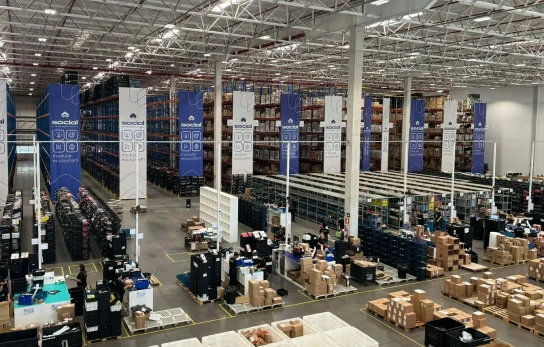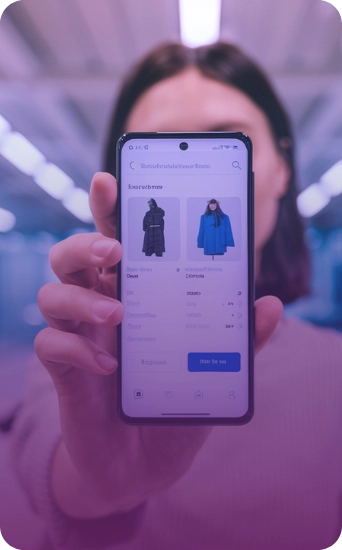How do you balance e-commerce efficiency and personalization?

Year after year, the e-commerce market demonstrates its strength, consolidating the online shopping environment as a great ally for consumers. Unlike initial concerns about a possible dilution of physical retail, today we know that the two channels can be complementary, especially with the integration of omnichannel strategies, for example. According to Confi, in 2024, Brazilian e-commerce will grow by more than 10% compared to 2023, exceeding a turnover of R$ 200 billion. This turnover is concentrated in around 50% of the audience of ten major platforms, with the top 5 made up of: Mercado Livre, Shopee, Amazon, OLX and Magalu. Another factor that has added complexity to the market is the consolidation of artificial intelligence (AI) as an indispensable tool for brands wishing to secure a competitive space in this digital ocean. AI has become essential for personalizing experiences, automating processes and optimizing the purchasing journey. In this scenario, full commerce remains a strategic solution for many brands that choose to focus on their core business, delegating the operation to specialists capable of dealing with logistical, multichannel and multicustomer complexity. Operational challenges in full commerce Full commerce operations go beyond simply consolidating e-commerce processes. They need to balance the demands of a multi-customer and multi-product environment, ensuring sufficient standardization to maintain productivity without compromising the customization needed to reflect each brand's identity. Examples of this balance include: Overcoming these challenges requires a structured approach, in which a well-implemented Process and Quality Management System (QPMS) becomes the foundation for success. How can a process and quality management system help? The QMS can be summed up in three main pillars: standardization, monitoring and continuous improvement. A large part of a full commerce operation takes place in the logistics environment, where operational efficiency is indispensable. The implementation of strategic metrics and KPIs, such as stock accuracy rate and OCT (Order Cycle Time), ensures that processes are measurable and manageable. A well-structured QMS can, for example, significantly reduce picking times, optimize the use of inputs and even improve the layout of the logistics center, increasing the efficiency of inbound and outbound processes. The implementation of tools such as BPMN (Business Process Model and Notation) for mapping workflows and the creation of SOPs (Standard Operating Procedures) guarantee uniformity in essential processes such as picking, packing and shipping. However, in a multi-product and multi-customer operation, customization is also essential. The big challenge is that without standardization, customization becomes chaotic and difficult to manage. With an efficient QMS, customizations follow a controlled cycle: design solution, training, implementation and monitoring, allowing full commerce to be agile and flexible without compromising efficiency. Sustainable and competitive operations A well-structured QMS not only improves operational efficiency, but also contributes to the viability and sustainability of the business. Standardized and monitored processes reduce waste, optimize resources and increase competitiveness in the market. Practical examples include: Aligning standardization and personalization in full commerce In the dynamic and challenging scenario of full commerce, the balance between standardization and personalization is a competitive differentiator. An effective Process and Quality Management System not only simplifies complex operations, but also allows brands to deliver unique experiences to the end consumer. The main message is clear: viable, sustainable and scalable operations depend on robust processes, aligned with the specific demands of each client. There is still a lot to be explored when it comes to process innovation and quality assurance in customer service, especially with the efficient use of traditional tools such as NPS and other strategic metrics. These are points I intend to explore in greater depth at a later date, as the subject is vast and full of possibilities.
We are made to go further

In our journey of evolution and strengthening as a Full Digital Commerce company, we have improved our communication to convey even more trust and commitment to our customers. Check it out below! We present digital as a universe much bigger than you think, where the possibilities for expanding operations, borders and results are much greater. For all starting points, we are a stepping stone, because we are in the world to evolve. We exist to make your brand go further, to build the path with you. We are Unlimited Digital Commerce. We are made to go further!
The potential of full commerce on Black Friday

Regarded as the main retail date, the expectation of buying for Black Friday 2024 is high, as 66% of Brazilians plan to take advantage of some offer, according to a survey by Wake, in partnership with Opinion Box. Boosting global trade, the period demands solutions such as Full Commerce, which contributes to the professionalization of online store management, thus minimizing the amateurishness of e-commerce. This year, on November 29th, Black Friday will last for weeks with initiatives such as "Black Week" and "Black November", demanding agility in operations management. In fact, more than 30% of Brazilians started monitoring the price of products in July, which indicates early financial planning on the part of consumers in order to take advantage of excellent and significant offers. The role of the marketplace in this context Today, marketplaces are seen as the main destinations for customers in this period, which reinforces the growing digitalization of consumption and, above all, shoppers' preference for online channels in the search for the best deals. The Confi report, in partnership with E-Commerce Brasil, indicates that more than 70% of online sales in the first half of this year came from marketplaces, whether specialized or not. This emphasizes consumers' preference for e-commerce, especially for high value-added products such as household appliances, electronics and telephony, given the wide assortment of products, which guarantees customers more time and possibilities within the platform. In this sense, Full Commerce is a complete and effective solution, capable of optimizing digital strategies to strengthen the brand and increase sales, while meeting customer expectations in terms of speed, warehousing, receiving orders, picking, packing, delivery, customer service and customer support. Advantageous or not? Offering a panoramic view of the business, the model has specific advantages for the development of virtual stores, thus bringing greater efficiency and scalability, primarily during periods such as Black Friday. Helping to reduce operating costs, the solution also has data that contributes directly to more assertive methodologies, as it monitors the store's performance, interprets valuable information and makes the necessary adjustments according to the target audience's buying behavior. In short, Full Commerce minimizes the complexity of the operation by identifying bottlenecks and looking for strategic resources that make a difference in delivery management, for example. In fact, Full Commerce determines the success of e-commerce on the main retail date. Able to connect all ends of the online shopping journey, the methodology plays a crucial role in converting, attracting and retaining customers. Is it worth investing in Full Commerce? In order to maximize opportunities, executives who adopt Full Commerce as a strategic approach will be able to stand out and, consequently, win a significant share of the market during Black Friday. I advise retailers to invest in robust technological infrastructure, efficient logistics, personalized campaigns and, above all, to anticipate their demands in line with customer needs. Having a partner who specializes in Full Commerce enables a scalable 360 digital operation. According to a survey by Opinion Box and Dito, 43% of consumers intend to spend more, which indicates that they will spend more than 2023 for the date. This confirms a successful Black Friday, especially for retailers who invest in personalization, omnichannel, sustainability and technological innovation. There is no doubt that Full Commerce is beneficial for companies, given the volume of online sales that this year's Black Friday is expected to generate. In fact, according to estimates by Neotrust Confi, consumption via e-commerce is expected to be 9.1% higher than last year, which is optimistic for the global economic scenario.
Digitalization is the next step your business needs to grow!

Find out about the success stories that rely on Social Digital Commerce to strengthen their presence in the digital world. Concha Y Toro, the world's most admired wine brand, performed exceptionally well on Black Friday 2023, exceeding its sales target by 154%. This success was possible thanks to our partnership, where we offer innovative and integrated solutions to connect the physical and digital worlds, guaranteeing a complete shopping experience. Our main differentiators include: At Social, we led Concha y Toro's Full Commerce management, taking care of the administration of its flagship, marketplaces and delivery apps, with efficient logistics from the logistics centers. The relaunch of the Xuxa doll by Estrela was a real phenomenon! By relying on our solutions, Estrela provided an unparalleled shopping experience, delighting both new consumers and nostalgic fans. The result was impressive: 940 dolls were sold in just 15 hours at the brand's flagship store, with orders invoiced in 24 hours. Why Social? By bringing the challenge to us, Estrela had access to a robust, multi-channel operation that boosted sales and guaranteed extraordinary results. The main differentials of this partnership were: In an iconic relaunch, Xuxa's doll shone again, and Estrela, alongside our team and structure, showed that combining tradition and innovation is the key to success. When the focus is on the client and operations are well managed, the results are extraordinary. Our modular ecosystem boosted Estrela's digital presence, which reaffirmed its place in the hearts of Brazilians. Recognized worldwide for producing the iconic Cachaça 51, Estrela has always been a benchmark in the distilled spirits segment in Brazil. The company was looking to evolve its presence in the digital market as a way of keeping in touch with its public. For this challenge, Companhia Müller chose us as a partner to digitize the business and present its portfolio in an innovative and efficient way. Why Social? The decision to take the first step in its digital presence was a strategic one for Companhia Müller, and the main reasons for choosing us as a partner were: We took on the complete management of Companhia Müller's digital operations, which included flagship, marketplaces and fulfillment with logistics centralized in our distribution center located in Extrema, Minas Gerais. This demonstrates how digitalization and innovation are essential for the expansion and strengthening of traditional brands in the current scenario. With 60 years of history, Brandili is a reference in children's and teen fashion in Brazil, recognized for the quality and comfort of its products. In 2024, the company began operations with us, relying on the expertise of our team of specialists to strengthen its e-commerce presence and offer a complete shopping experience for its consumers. Why Social? Brandili chose Social to achieve strategic objectives, such as: We manage Brandili's end-to-end operation, taking care of the flagship, marketplaces, customer experience (CX), digital performance and product distribution, operated by our logistics center in Itapevi, São Paulo. This partnership brings together tradition and innovation in the competitive children's and teen fashion market. Beyoung is a leading brand in its skincare and make-up segment with cruelty-free, vegan and sustainable products. Seeking to reduce labor costs and gain agility in areas such as IT, logistics, transport and platform, the company chose us to optimize its operations and transform its performance. Why Social? The main differentiating factor was the customization of the operation, something that Beyoung hadn't been able to achieve until then. The solutions offered include: We are responsible for managing Beyoung's e-commerce, covering fulfillment, flagship, marketplace and CX in both B2B and B2C. This partnership exemplifies how the combination of technological innovation and operational excellence can transform companies, enabling them to reach new levels of competitiveness and success.
What is Unified Commerce?

Referred to as the integration of all sales channels on a single platform, the Real Unified Commerce concept brings even more value to the consumer, as it improves the customer experience at different points in their journey and, consequently, the relationship with the brand. This strategy gives shopkeepers the security of creating a higher performance experience for the consumer, since the data is processed and analyzed on a single platform, providing the customer with a one- or two-click purchase, regardless of the channel. The fact is that ten years ago we were debating the advantages of omnichannel for retail and today we are evaluating its possible evolution with unified commerce. The common point between the two strategies remains the same: optimizing the shopping experience. After all, the main asset of the business is and always will be the customer. However, I believe that we have not yet taken the first step towards omnichannel, with the aim of really improving the customer journey through channels that convert sales from physical to digital retail and vice versa. I believe that Unified Commerce is the second step in this journey, which mainly seeks to optimize the consumer experience by promoting a more fluid, organic, fast and natural purchase between the brand's channels. Remembering that the advance of unifying all data, logistics and means of payment must not overshadow the concern for the customer at the end. In fact, the industry's high demand for D2C solutions, in which sales are made directly to the end consumer, without intermediaries, is remarkable. Not surprisingly, Social has seen an increase of 70% in the number of customers seeking this alternative in the last year, in order to understand the real customs and, above all, the needs of the buyer, something that is often impossible to map in the distribution channel alone, for example. The data is fundamental in developing new products and campaigns, as well as helping to monitor the most effective channels for a given company. It is possible to create commercial policies, as long as they are appropriate, thus making D2C more of a sales channel, i.e. an alternative and complementary solution that does not exclude sales by shopkeepers, resellers or even specific stores. Therefore, the current challenge lies in training the people at the top of the retail chain. Investing in efficient training makes the analysis of this data more strategic, while a well-trained team interprets the information and effectively guides the industry and retailers. The data dictates the rules of the game and thus determines which path to follow, guiding the salesperson in this conversion process based on unification. When we understand the customs and needs of each customer, we can effectively increase the conversion of an abandoned cart, for example. Therefore, there is an arduous and challenging road ahead, which increasingly demands, in addition to employee training, investment in new technologies such as artificial intelligence to boost retail productivity while reducing costs.
The best Full Service in Latin America and Europe

Did you know that we guarantee personalized sales management, unique shopping experiences and efficient product delivery? 10 reasons to choose Social Digital Commerce: 1. Complete or modular system of digital solutions; 2. Multiple sales channels: B2B, B2C, B2E, B2B2C, B2D; 3. Efficient transport, reducing delivery time to the consumer, with Same Day and Next Day deliveries to the main cities in Brazil; 4. Diverse segments and multiple collection channels; 5. Rapid scaling of operations during periods of high demand, such as Black Friday, without compromising the quality of the service; 6. Integration with the main marketplaces; 7. Team with over 20 years of expertise; 8. Global operation with cross border; 9. NPS above the market average; 10. And most importantly: we guarantee expected returns! Do you want to scale your digital business with physical retail experience? Count on specialized hubs to strategically boost your business! Digital Commerce: Increase the scale of sales and deliver the best shopping experiences. Retail Experience: Go beyond digital and promote a true shopping experience, without limits. Marketing Intelligence: Achieve sales recurrence and high engagement with data-driven strategies. Loyalty Program: Build stronger, longer-lasting relationships with your audience. There are already 80 satisfied clients, from different industries, such as: Leverage results by integrating marketing, sales and fulfillment!Talk to our experts here!
Why are industries in Brazil relying on specialized companies to dominate the online market?

In the dynamic and competitive Brazilian e-commerce scene, industries are discovering a well-kept secret: partnering with full commerce companies. We specialize in offering complete solutions for e-commerce, making us an indispensable strategic ally for brands and industries that want to not only participate in, but dominate the digital market. Here are the reasons why these full commerce companies are becoming strategic partners in transforming the e-commerce landscape in Brazil and around the world: Integrated and Complete Solutions These companies offer a complete package of services covering all stages of e-commerce. This includes everything from platform development and management to digital marketing, logistics, customer service and data analysis. This integrated approach allows brands to have a single point of contact for all their e-commerce needs, resulting in greater operational efficiency and consistency in strategy execution. Technological Expertise Technology is the backbone of modern e-commerce, and full commerce companies are at the forefront of this revolution. They continually invest in technological innovations to ensure that their e-commerce platforms are fast, secure and scalable. In addition, they use advanced UX techniques to create intuitive interfaces and simplified purchasing processes, which translates into greater customer satisfaction and loyalty. Focus on Business IntelligenceThe use of BI is one of the areas where these companies really excel. By collecting and analyzing large volumes of data, they are able to provide valuable insights that help brands make more informed decisions. This includes identifying market trends, forecasting demand, personalizing offers and optimizing stocks. BI also plays a crucial role in preventing fraud and detecting irregularities, thus protecting the interests of brands. Efficient logisticsLogistics is one of e-commerce's biggest challenges, especially in a country as large as Brazil. Full Commerce has the expertise to manage the entire logistics chain, from storage to final delivery. They use advanced stock management systems and strategic partnerships with carriers to ensure that products reach customers quickly and safely, reducing costs and delivery times. Flexibility and scalability As brands grow and their needs evolve, the flexibility and scalability of the solutions offered by full commerce companies become even more important. These companies are able to adapt their operations to meet growing demand, whether during seasonal periods of high sales or market expansions. This ability to scale quickly without compromising service quality is a significant competitive differentiator. Full commerce companies are transforming e-commerce in Brazil by offering complete, integrated solutions that enable the biggest brands to dominate the online market. Social Digital Commerce, which has been operating in Brazil for seven years, offers all these differentiators to its clients. With four service hubs, it has seven distribution centers in four states (São Paulo, Minas Gerais, Espírito Santo and Santa Catarina) and two countries (Portugal and the United States).
CEO of Social, Ricardo Onofre takes part in the episode 'The reinvention that led to Full Commerce' of the Quarto Ato Podcast

In episode 183 of the Quarto Ato podcast, Ricardo Onofre (CEO of Social Digital Commerce) shares his experience in foreign trade and how he migrated to the Full Commerce sector together with Social's partner, co-founder and CGO, Diogo Olher.
The growth of the publishing market and its contribution to e-commerce

The publishing market has experienced significant growth in recent years. The arrival of TikTok in Brazil boosted this movement, as young users of the app began to publish videos on various topics, including books. Terms such as "booktokers" and "bookinfluencers" have become commonplace, referring to influencers and celebrities who dedicate their content to the literary world. This influence has stimulated interest in reading among young people and opened up new opportunities for authors and publishers to connect directly with their target audience. Generation Z plays a key role in various market sectors today. Young people, who spend more time on the app, consume the content and take the opportunity to influence their friends to also start consuming and engaging with the same content. As a result, "trends" are launched, which are the trends of the moment and are a huge hit both inside and outside the app, generating more purchases and demand for the products that this generation consumes, leading to sales in various sectors, including e-commerce. As a result, the publishing market has expanded considerably, leading publishers to increase their sales and invest in e-commerce to better serve their customers and satisfy consumer demands. In 2023, the turnover of the publishing market in Brazil was approximately R$2.52 billion, with around 54.4 million books sold, registering a slight drop of 0.78% compared to 2022. In the e-commerce sector, turnover in 2023 reached R$186 billion, according to data from the E-commerce Brasil portal. Although the specific data on the publishing market's e-commerce turnover is not detailed separately, it is clear that the sale of books contributes significantly to the total profits in this segment. One example of lucrative turnover in the book market within e-commerce took place during Black Friday 2022. The publisher Darkside, a specialist in the Dark book segment (true crime, suspense, horror, comics and fantasy), adopted a strategy with Social Digital Commerce and played a key role in the management, logistics and sales strategy during this period, developed through the Digital Management hub. The result was more than 10,000 books sold that were delivered over four days of Black Friday, a historic milestone for literature. Black Friday 2023 was also an example of rich sales, where the brand exceeded more than 10,000 orders, totaling 38,000 items sold during the entire month. As a result, it is possible to foresee increasing growth in the publishing market, with publishers and bookstores investing more and more in e-commerce to boost sales and provide a differentiated and satisfying customer journey.
B2B, B2C, B2B2C and B2E: business models with digital solutions from Social Digital Commerce

The world of online shopping has different business models. Each one is associated with what the public and companies are looking for, valuing a safe, assertive shopping experience that builds customer loyalty. A business model serves to identify and solve companies' problems, with the aim of increasing profits, gaining scale and/or reducing costs. Social Digital Commerce, a Fullcommerce company, offers its clients various business models, such as B2B, B2C, B2B2C and B2E. Find out the main differences between them: Having been on the market for seven years, Social Digital Commerce enables its clients to take advantage of the business models mentioned above, with the difference of customizing each of these models, which are allocated within the company's four business hubs.










